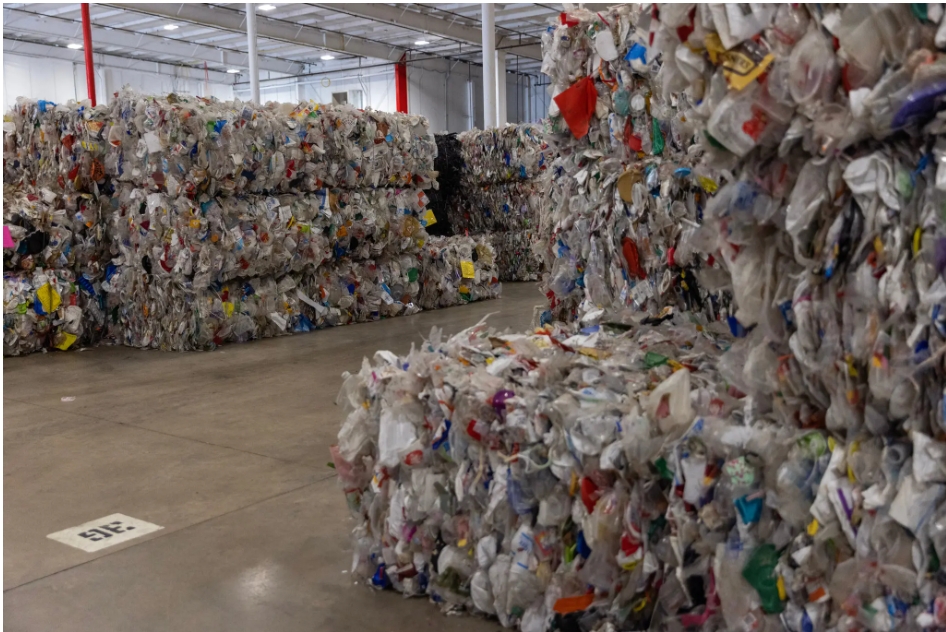I recall from month or two ago a comment by a plastics company executive saying that getting rid of plastics in grocery store packaging would “create a mess.” That was the reason he cited for not trying to deal with plastics pollution. My take-away message was that it was a darned good reason to get going right now to try to deal with the problem. The plastics pollution issue seems to be picking up traction with the public. The NYT writes (whole article not behind paywall for 30 days):
What began with cellophane in the 1930s picked up speed with the rise of plastic clamshells in the 1980s and bagged salads in the 1990s. Online grocery shopping turbocharged it. But now the race is on for what people who grow and sell fruits and vegetables are calling a moon shot: breaking plastic’s stranglehold on produce.
In a March survey among produce professionals on LinkedIn, the shift to biodegradable material was voted the top trend. “It’s big,” said Soren Bjorn, chief executive officer of Driscoll’s, the world’s biggest grower of berries, which has switched to paper containers in many European markets.Spain has a plastic tax. France has severely limited plastic-wrapped produce and the European Union is about to add its own restrictions. Canada is trying to hammer out a plan that could eliminate plastic packaging of produce by 95 percent by 2028. In the United States, 11 states have already restricted plastic packaging. As part of a sweeping anti-waste plan, the Biden administration is calling for new ways to package food that uses climate-friendly, antimicrobial material designed to reduce reliance on plastic.Yet plastic has so far been the most effective tool to fight another environmental threat: food waste.Selling produce is like holding a melting ice cube and asking how much someone will pay for it. Time is of the essence, and plastic works well to slow the decay of vegetables and fruit. That means less produce is tossed into the garbage, where it creates almost 60 percent of landfill methane emissions, according to a 2023 report by the Environmental Protection Agency.
Consumers increasingly report that using less plastic and packaging matters to them, but their shopping habits tell a different story. American shoppers bought $4.3 billion worth of bagged salad last year, according to the International Fresh Produce Association. Marketing experiments and independent research both show that price, quality and convenience drive food choices more than environmental concerns.
Battle lines seem to be drawn between the never-plastic crowd and shoppers who prefer the ease of fresh salad greens delivered to their door. (emphasis added)
On top of those conflicting considerations is the mirage called recycling. At least since the 1970s we were confidently told that plastics would be recyclable. It was a lie in the 1970s and it still is a lie in 2024. About 91% of plastics cannot be or are not recycled. That has not changed much or at all in at least 2-3 decades.
But with more consumers now getting antsy about microplastics and nanoplastics being found in fun and exciting places like both sides of the human placenta in pregnant women, bottled water and much or all of our food, some behemoth companies are now blowing fresh smoke about recycling yet again. They are recycling and repackaging the old 1970s recycling propaganda in a new and improved veneer of bullshit!! The NYT writes (whole article here not paywalled for 30 days):
By 2025, Nestle promises not to use any plastic in its products that isn’t recyclable. By that same year, L’Oreal says all of its packaging will be “refillable, reusable, recyclable or compostable.”
And by 2030, Procter & Gamble pledges that it will halve its use of virgin plastic resin made from petroleum.
To get there, these companies and others are promoting a new generation of recycling plants, called “advanced” or “chemical” recycling, that promise to recycle many more products than can be recycled today.
So far, advanced recycling is struggling to deliver on its promise. Nevertheless, the new technology is being hailed by the plastics industry as a solution to an exploding global waste problem.PureCycle Technologies, a company that features prominently in Nestlé, L’Oréal, and Procter & Gamble’s plastics commitments, runs one such facility, a $500 million plant in Ironton, Ohio. The plant was originally to start operating in 2020, with the capacity to process as much as 182 tons of discarded polypropylene, a hard-to-recycle plastic used widely in single-use cups [some of which are 0% recycled], yogurt tubs, coffee pods [so far 0% recycled] and clothing fibers [so far >90% not recycled], every day.
But PureCycle’s recent months have instead been filled with setbacks: technical issues at the plant, shareholder lawsuits, questions over the technology and a startling report from contrarian investors who make money when a stock price falls. They said that they had flown a drone over the facility that showed that the plant was far from being able to make much new plastic.
PureCycle, based in Orlando, Fla., said it remained on track. “We’re ramping up production,” its chief executive, Dustin Olson, said during a recent tour of the plant, a constellation of pipes, storage tanks and cooling towers in Ironton, near the Ohio River. “We believe in this technology. We’ve seen it work,” he said. “We’re making leaps and bounds.”
PureCycle’s woes are emblematic of broad trouble faced by a new generation of recycling plants that have struggled to keep up with the growing tide of global plastic production, which scientists say could almost quadruple by midcentury.
A chemical-recycling facility in Tigard, Ore., a joint venture between Agilyx and Americas Styrenics, is in the process of shutting down after millions of dollars in losses. A plant in Ashley, Ind., that had aimed to recycle 100,000 tons of plastic a year by 2021 had processed only 2,000 tons in total as of late 2023, after fires, oil spills and worker safety complaints.
Well ladies and germs, there we have it. They are “ramping up production” and “making leaps and bounds.” I translate that into “We’re blowing dense clouds of toxic, plastics-laden smoke in your general direction. And please, pay no attention to those technical issues, shareholder lawsuits, drone videos, fires, oil spills and worker safety complaints. Everything is going to be just fine.” . . . . . . . . Huh?
Q: Is Germy simply being too cynical here, or does the plastics industry rock solid track record of deceit and failure to deliver on promises negate such horrible thoughts?
Plastics industry lobbyists converging on
congress with briefcases full
of free speech cash!
briefcases full of free speech






No comments:
Post a Comment